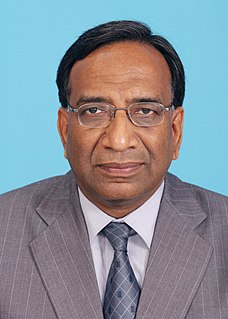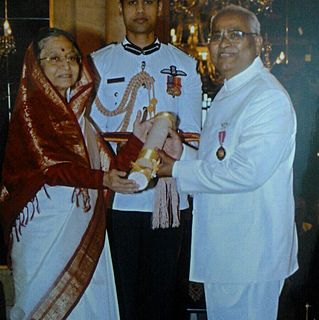Related Research Articles

The Indian Administrative Service (IAS) is the administrative arm of the All India Services of Government of India. Considered the premier central civil service of India,the IAS is one of the three arms of the All India Services along with the Indian Police Service and the Indian Forest Service. Members of these three services serve the Government of India as well as the individual states. IAS officers are also deployed to various government establishments such as constitutional bodies,staff &line agencies,auxiliary bodies,public sector units,regulatory bodies,statutory bodies and autonomous bodies.
The Finance Secretary is the administrative head of the Ministry of Finance. This post is held by senior IAS officer of the rank of Secretary to Government of India. T. V. Somanathan is the incumbent Finance Secretary.
The All India Services (AIS) comprises two central civil services:the Indian Administrative Service and the Indian Police Service along with one central natural resources service:Indian Forest Service. A unique feature of the All India Services is that the members of these services are recruited by the centre,but their services are placed under various State cadres,and they have the ability to serve both under the State and under the centre. Due to the federal polity of the country,this is considered one of the tools that makes union government stronger than state governments. Officers of these three services comply to the All India Services Rules relating to pay,conduct,leave,various allowances etc.

The Indian Forest Service (IFS) is one of the three All India Services of the Government of India and is one of the central natural resource services. The other two central civil services being the Indian Administrative Service and the Indian Police Service. It was constituted in the year 1966 under the All India Services Act,1951,by the Government of India.

The Union Public Service Commission,commonly abbreviated as UPSC,is India's premier central recruitment agency for recruitment of all the Group 'A' officers under Government of India. It is responsible for appointments to and examinations for all of the Group 'A' posts of all the union government establishments which also includes all of the central public sector units and all of the central autonomous bodies. While Department of Personnel and Training is the central personnel agency in India.

The Ministry of Defence (MoD) is charged with coordinating and supervising all agencies and functions of the government relating directly to national security and the Indian Armed Forces. The President of India is the ceremonial commander-in-chief of the armed forces of the country. The Ministry of Defence provides policy framework and resources to the armed forces to discharge their responsibility in the context of the defence of the country. The Indian Armed Forces and Indian Coast Guard under the Ministry of Defence are primarily responsible for ensuring the territorial integrity of India.

Margaret Alva is an Indian Politician who served as the 17th Governor of Goa,23rd Governor of Gujarat,20th Governor of Rajasthan &4th Governors of Uttarakhand the until the end of her tenure in August 2014. She has formerly served as the Cabinet Minister. She took over in Rajasthan from the Punjab governor,Shivraj Patil,who had been holding an additional charge of that state. Before being appointed governor,she was a senior figure in the Indian National Congress and was Joint Secretary of the All India Congress Committee. Her mother-in-law,Violet Alva,was the speaker of Rajya Sabha in 1960s.

Naresh Chandra was a 1956 batch IAS officer of Rajasthan cadre,who served as the Cabinet Secretary of India,Defence Secretary of India,Home Secretary of India,Water Resources Secretary of India and Indian Ambassador to the United States. He was awarded India's second highest civilian honour,the Padma Vibhushan,for civil service,in 2007.
The Indian Economic Service is a inter-ministerial and inter-departmental central civil service under Group A of the executive branch of the Government of India. The unique aspect of the service is that the cadre posts are spread across various departments and ministries of central government numbering more than 55. It is a highly specialised and professional service within the government of India catering to economic analysis and policy advice.
The Manipur Public Service Commission is the Constitutional body constituted for recommending candidates for recruitment to various posts of the Government of Manipur. It also gives concurrence on the recommendation of Departmental Promotion Committee for appointment to various posts. The Commission also gives concurrence on the framing/ amendment of Recruitment Rules. It also tender advice to the Government Departments on service matters including disciplinary cases.
Central Secretariat Service is the administrative civil service under Group A and Group B of the Central Civil Services of the executive branch of the Government of India. They are governed by Central Secretariat Service Rules of 1962,which has been issued under the powers of Article 309 of the Constitution of India. The service members work under restrictions and rules of Central Civil Services (Conduct) Rules.

The foreign secretary of India is the top diplomat of India and administrative head of the Ministry of External Affairs. This post is held by an Indian foreign service officer of the rank of secretary to the government of India. Vinay Mohan Kwatra is an Indian diplomat and currently 34th Foreign Secretary of India from May 2022,succeeding Harsh Vardhan Shringla. Previously,he has served as ambassador to France and Nepal.
The Civil Services refer to the career government civil servants who are the permanent executive branch of the Republic of India. Elected cabinet ministers determine policy,and civil servants carry it out.

The Cabinet Secretary is the top-most executive official and senior-most civil servant of the Government of India. The Cabinet Secretary is the ex-officio head of the Civil Services Board,the Cabinet Secretariat,the Indian Administrative Service (IAS),and all civil services under the rules of business of the government.

Pradeep Kumar is a former Indian Administrative Service (IAS) officer,1972 batch,of the Haryana cadre,who served as Defense Secretary,in the Ministry of Defence,Government of India,for a term of two years,from August 2009 to July 2011. He succeeded Vijay Singh,IAS,1970 batch,who,on superannuation,was appointed as member of the UPSC. In July 2011,on superannuation,he was appointed as chief vigilance commissioner of India.

Vijay Singh is a former officer from the Indian Administrative Service (IAS),1970 batch,Madhya Pradesh Cadre. He was appointed Defence Secretary,in the Ministry of Defence,in August 2007. He succeeded Shekhar Dutt,IAS,of 1969 batch,who,on superannuation,was appointed as Deputy National Security Advisor for Strategic and Defence related subjects in the National Security Council Secretariat,with rank and pay of Secretary to the Government of India,for a term of 2 years. In 2018,he was made chairman of Tata Advanced Systems and vice-chairman Tata Trusts.
Joint Secretary to Government of India is a post under the Central Staffing Scheme and the third highest non-political executive rank in Government of India. The authority for creation of this post solely rests with Cabinet of India.

Mata Prasad is a retired Indian Administrative Service officer. He was one of the first people from the Scheduled Castes and Scheduled Tribes to become an IAS officer. He is a former chairman of the Union Public Service Commission of India. He served as the chief secretary of the state of Uttar Pradesh from June 1995 to October 1996,thus becoming the first Scheduled Caste officer to head the state bureaucracy. The Government of India awarded him the third highest civilian honour of the Padma Bhushan,in 2012,for his contributions to civil service.

The Chief Secretary is the top-most executive official and senior-most civil servant of the state government. The Chief Secretary is the ex-officio head of the state Civil Services Board,the State Secretariat,the state cadre Indian Administrative Service and all civil services under the rules of business of the state government. The Chief Secretary acts as the principal advisor to the chief minister on all matters of state administration.
Secretary to the Government of India,often abbreviated as Secretary,GoI,or simply as Secretary,is a post and a rank under the Central Staffing Scheme of the Government of India. The authority for the creation of this post solely rests with the Union Council of Ministers.
References
- 1 2 3 4 5 6 7 8 "18th Report of UPSC" (PDF). Union Public Service Commission . Archived from the original (PDF) on 2020-06-30. Retrieved 30 June 2020.